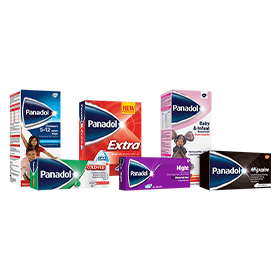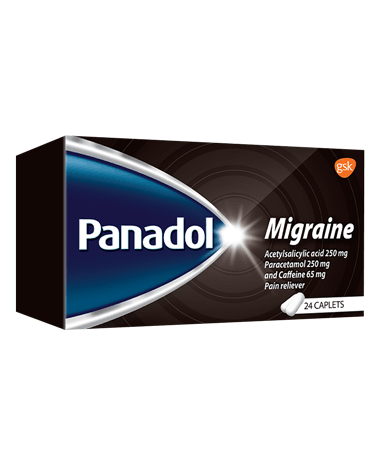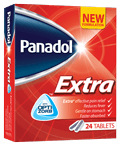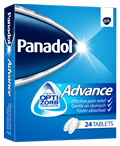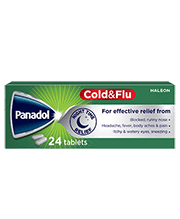Panadol Migraine

250mg Paracetamol + 250mg acetylsalicylic acid + 65mg caffeine
Panadol Migraine is an effective (over the counter) OTC migraine treatment. In clinical studies, patients with moderate to severe migraines experienced effective relief with just one dose. Migraine symptoms may vary, but often start on one side of the head, along with pulsating or throbbing pain. This can be combined with nausea, vomiting, and sensitivity to light and sound.
Panadol Migraine contains acetylsalicylic acid, paracetamol and therapeutically active caffeine.
What does it relieve?
Panadol Migraine is recommended for treatment of tough pain such as:
- Migraine
- Headache
- A cold
- Arthritis
- Muscular aches
- Sinusitis
- Toothache
- Premenstrual and menstrual cramps
What's the format?
Film coated caplets.
What are its features?
Tough pain relief
Relieves minor aches and pains due to headache, a cold, arthritis, muscular aches, sinusitis, toothache, premenstrual and menstrual cramps.
- Read more
- Read less
Dosage & Direction for use
Please refer to the leaflet.
*Only available in UAE, Qatar & Lebanon
Also available in:
Usage directions, ingredients and warnings
Before using Panadol Migraine be sure to check the product ingredients and directions for use, and make sure you are familiar with any warnings and precautions.
Learn more below.
Place caplet(s) in mouth and swallow with a full glass of water.

- 250 mg paracetamol
- 250 mg acetylsalicylic acid
- 65 mg caffeine
Please refer to the leaflet.
Enquiries
If you would like any further information regarding Panadol products, please call our INFOLINE (Freecall) +973 16500404 - Gulf & Near East countries
Email : mystory.ae@haleon.com

